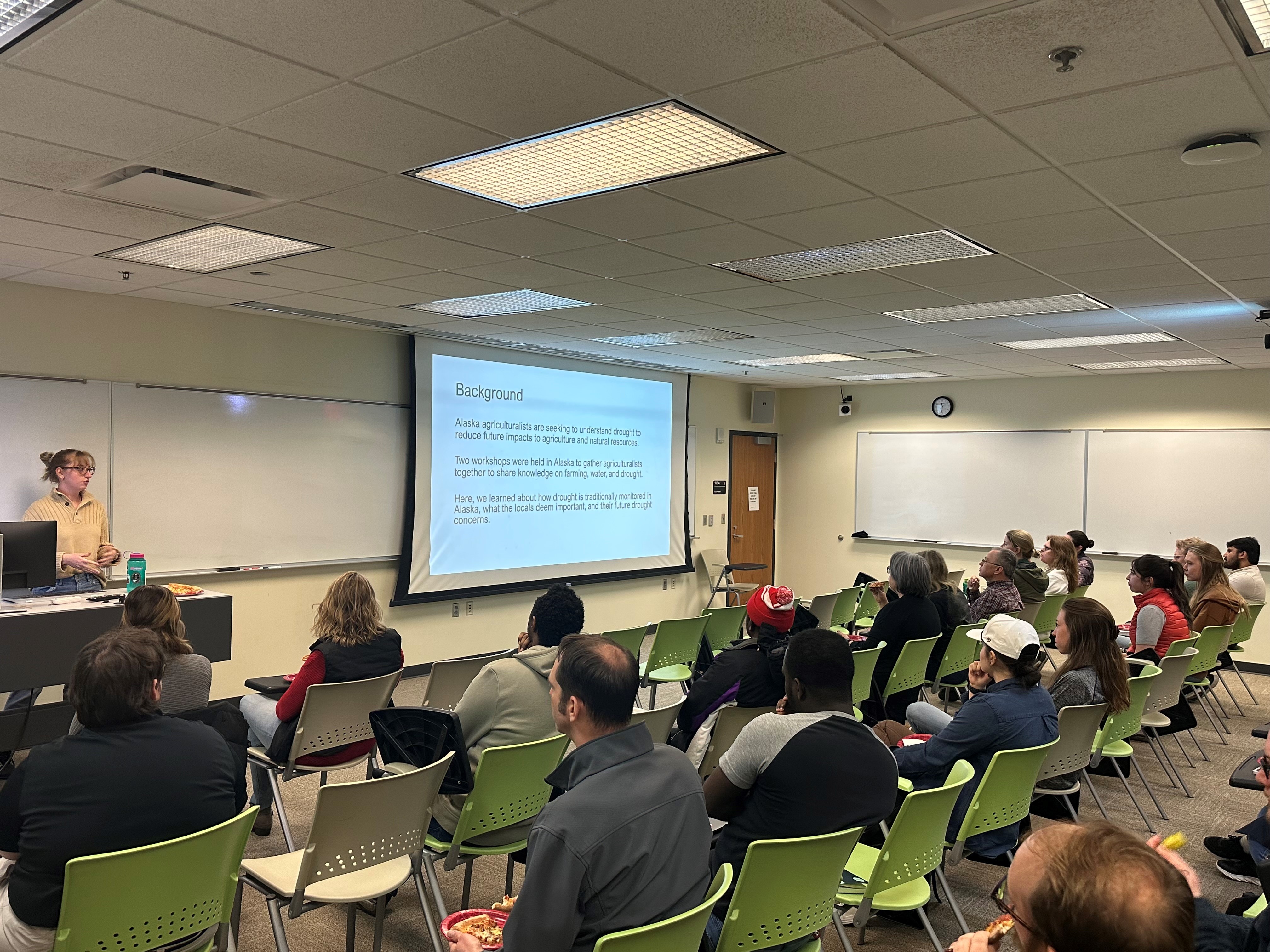
— by Jerome Okojokwu-Idu, SNR graduate student
Graduate students at the School of Natural Resources, University of Nebraska – Lincoln, made presentations on parts of their ongoing thesis and dissertation research projects in a seminar that was held last Wednesday at the north wing of Hardin Hall, East campus. The event provided a platform to discuss their research, get feedback from the faculty, other students, and committee members, develop presentation skills, and connect with fellow researchers.
The seminar, which was put together by the Graduate Student Assembly (GSA) of SNR, had both presenters from Climate Assessment and Impact, and the Applied Ecology specializations. While Katie Campbell spoke on the reproductive health of African elephants, Grace Campbell’s research was on drought mitigation. The graduate students made a brief introduction to their study and proceeded to give an overview of their research methodology, early significant findings, and concluded with a summary of their ongoing work.
‘The last drought frontier: Building a drought index for the State of Alaska’ was presented by Grace Campbell. She outlined the current nature of drought in the State of Alaska, the present effects, and how scientists and other stakeholders are trying to understand the future impacts. Noting the immediate, potential use of the research, she identified the stakeholders of the study and expressed optimism that the result of the concluded work had room for immediate application.
“My research is basically to enhance the understanding of drought in Alaska. So, I set out to create a comprehensive picture of drought in the State while capturing its unique characteristics by identifying and using regionally appropriate climate information.
“I expect that this research will be the first step towards creating an operational drought index for Alaska to help fill gaps in spatial drought monitoring coverage,” she said.
Stating her desire to pursue a Ph.D. degree upon completion of the master’s degree, Grace Campbell identified the beneficiaries of the project. “Society, particularly in Alaska, will benefit from my research because they will have something easy and simple to look at that would tell them how dry it currently is in their area,” she noted.
On her part, the second speaker who is also the convener of the seminar and president of the GSA, Katie Campbell, noted that the bi-monthly event registered its largest turnout since it was introduced.
“It was a good outing today. We’ve seen renewed interest and commitment from students willing to take the stage and showcase what they’ve been researching.
“Our appreciation goes to those who have made this possible including my fellow executive members of the GSA, to Uche Ogbenna for his oversight duty as the chairperson of the seminar committee, and particularly to the graduate students who normally show up as participants - whether to speak or to listen.
“Special thanks to members of the faculty who ensured that this succeeds by prompting their students to embrace the voluntary challenge. They didn’t stop at that, they showed up still. And thanks to both Emma Hazel and Sara Winn for their administrative roles.”
The seminar provided an opportunity for graduate students to share their research and connect with peers across different specializations within SNR.
Commenting on the event, a faculty member – Dr. Deb Bathke stated, "The presentations were rich in content and added to the body of research here at SNR. I was extremely impressed at our students' professionalism and their research's real-world applicability. I love how SNR equips them to tackle challenges that have tangible outcomes and make a difference in understanding and managing natural resources.”
One of the student success specialists at SNR, Sara Winn opined that “These seminars are a great way to build community and provide a unique opportunity for students, faculty, and staff to come together, learn from each other, and showcase research happening right here in SNR. I am looking forward to the upcoming seminars this spring and building this tradition into the fall and beyond.”
In the same vein, the graduate students’ recruitment and retention coordinator for SNR thinks participants could glean a lot of new insights by watching their peers make these presentations. “This is a great way for our graduate student’s to highlight what they’ve worked so hard on during their time here in SNR. And practice makes perfect. It’s a way to prepare for their upcoming defense or future presentations.”
The presentations are open to public.
The remaining schedule on Wednesdays in 163 North Hardin Hall from 12:00 - 12:50pm includes:
April 5, 2023
Sophia Becker - Theoretical vs experimental relationship between K-40 counts and gravimetric water content at a well instrumented agricultural research station in Nebraska, USA.
Daniel Gschwentner - Nutrient limitation in chemically diverse lakes in the Nebraska Sandhills.
April 19, 2023
Catherine Chan - Influence of spatial scale on estimating biodiversity through remote sensing.
Uc he Ogbenna - How do flow regimes affect nutrient retention in reservoirs.
April 26, 2023
Anum Khushal - Characterizing Learning Environment for Quantitative Reasoning Skills in Undergraduate Biology
May 3, 2023
Megan Baldissara - Identifying and Prioritizing Habitat for Pheasant Conservation and Management in Agriculturally Dominated Landscapes.
More details at: https://snr.unl.edu/aboutus/when/seminars.aspx